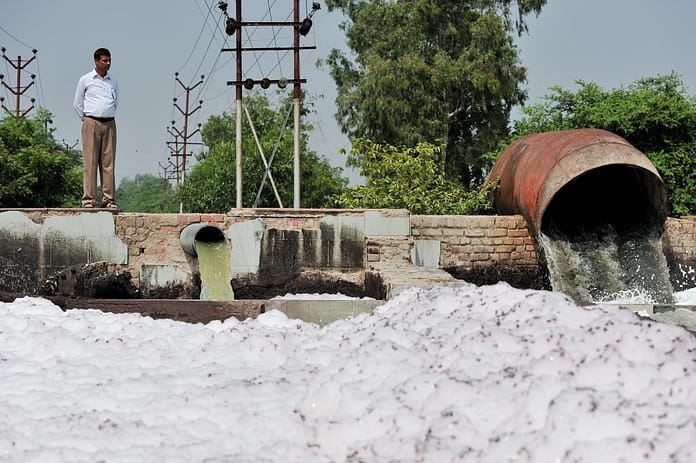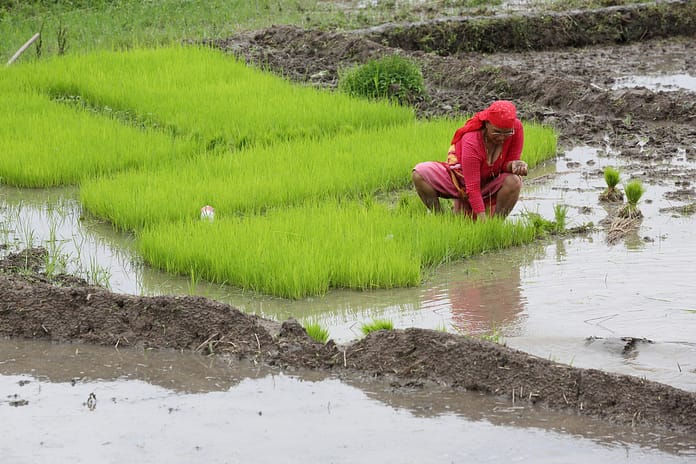Forecasting extremes, examining resource governance, establishing conservation, offering sustainable solutions and ensuring social inclusion are just some of the activities that IWMI researchers have been engaged in during March and April. Read on to discover the full extent of IWMI’s work over the past two months.

Future shifting of annual extreme flows under climate change in the Volta River basin.
The West African Volta River commands a river basin spanning parts of six countries beginning in Burkina Faso and flowing into the Atlantic Ocean via the coast of Ghana. The river enjoys huge hydropower potential, supports a bustling agricultural sector and is rich in biodiversity. Unfortunately, the river is vulnerable to the impacts of climate change with increasing variations in water flow having drastic implications for the frequency of droughts and floods. Published in April, this study co-authored by IWMI’s Sander J. Zwart looks at how timing, seasons and the amount of water flowing in the Volta River Basin might be affected by our rapidly changing climate. Using a method called ‘Circular Statistics’ the research team provided a ‘Mesoscale Hydrologic Model’ with climate data from numerous datasets to see how future river flow might change. The results showed that between 2021-2050 maximum river flow might increase from anywhere between 1%-80% while minimum flow might decrease by 7% – 19%. Understanding the extent of these variations should help stakeholders to prepare for weather extremes.
Read more here.
An evaluation of conventional and nature-based technologies for controlling antibiotic-resistant bacteria and antibiotic-resistant genes in wastewater treatment plants
Disease, death and soaring medical costs are consequences of antibiotic resistance; the result of the evolution of bacteria beyond the efficacy of the antibiotics used to treat them. Preventing the unfortunate repercussions of antibiotic resistance demands that we understand how resistance survives and spreads in water and sewage systems. Without this knowledge, antibiotic resistant bacteria threaten to expose more people to potentially fatal illnesses. Alongside colleagues, IWMI’s Moushumi Hazra has authored a paper reporting on sewage treatment and antibiotic resistance and the need for conventional and nature-based sewage treatment technologies that reduce the number of antibiotic bacteria.
Read more here.
Crop mapping in smallholder farms using unmanned aerial vehicle imagery and geospatial cloud computing infrastructure
Without the contributions of smallholder farmers to the agriculture sector many developing nations would struggle to prevent food insecurity. However, many of these farms and farmers lack the money and tools to produce their best results. Increasing productivity and advancing food security rely on innovative and low-cost agriculture technology. IWMI’s Tafadzwanashe Mabhaudhi is part of a research team which produced a study looking into the use of Unmanned Aerial Vehicles (UAVs) to map land on smallholder farms with the goal of maximizing their potential. Specifically focusing on a program called Google Earth Engine (GEE), the study found that the platform has useful applications for advanced image analysis and could help smallholder farmers to do better.
Read more here.
Development of a composite drought indicator for operational drought monitoring in the MENA region
As temperatures soar across the globe, the result of a rapidly changing climate, regions like MENA are forced to deal with the negative consequences of severe drought events: water scarcity, the exacerbation of poverty, forced displacement and increased vulnerability to disease and malnutrition. This paper, co-authored by IWMI’s Karim Bergaoui, Makaram Blhaj Fraj, Stephen Fragszy and Rachel McDonnell, explores the benefits of the monthly Composite Drought Indicator (CDI) produced by the Jordanian, Lebanese, Moroccan and Tunisian governments. Intended to help manage drought events by keeping track of anomalies in rainfall, plant life and soil moisture, the CDI supports ‘operational drought management’.
Read more here.
Fostering social inclusion in development-oriented digital food system interventions
How can we ensure that global south digital interventions in farming and food systems do not reinforce existing inequities? Alongside other colleagues, this paper by IWMI’s Simon Langan and Felix Ouku Opola underlines the importance of prioritizing inclusivity for traditionally marginalized groups when it comes to access and usage of emerging digital technology. Digital innovations have the power to enhance participation and productivity in global south food systems. To ensure the advancement of this capacity, the authors believe “a stronger emphasis on inclusivity is required throughout the research for development system.”
Read more here.
Understanding Water Governance in the Central Rift Valley of Ethiopia: Governance Framework, Coherence and Practices
Sustainable water governance is not about quantity over quality, or quality over quantity; we need both to ensure water resources remain sustainable. In the Ethiopian Rift Valley (CRV) formerly rich water resources are coming under increasing strain as the extraction of water intensifies and overpowers the policy in place to protect sustainability in the region. IWMI researcher, Fitsum Hagos, contributed to a study examining the state of CRV water resources and governance which uncovered a lack of coordination between different water resource stakeholders as well as a lack of accountability in decision-making for the region. To reverse this unfortunate series of events the study suggests better coordination, transparency and accountability must be enforced.
Read more here.
Restoring degraded landscapes and sustaining livelihoods: sustainability assessment (cum-review) of integrated landscape management in sub-Saharan Africa.
Combatting land degradation in sub-Saharan Africa can accelerate agricultural productivity, improve social cohesion and advance environmental conservation. Using an Ethiopian and Mali case study approach, this IWMI study measured the ‘sustainability gains’ of Integrated Land Management (ILM) to improve degraded land. Changes in household income, crop growth and soil loss were measured with the sustainable intensification assessment framework (SIAF) and found that ILM has a positive impact on both land and lives in the two African nations.
Read more here.


